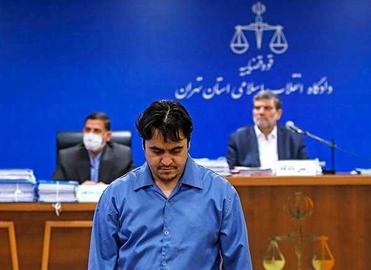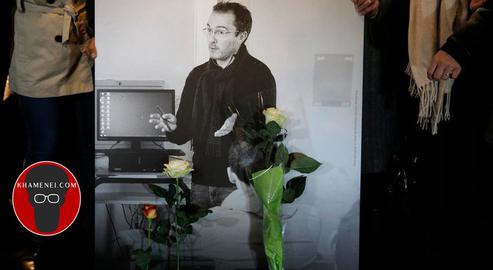Over the last decade, Iranian journalists, citizen journalists, and activists have been punished repeatedly for expressing views and sharing information. They have faced imprisonment, been handed down death sentences, tortured and killed, threatened and intimidated, all too often without authorities being held accountable to public opinion.
Eight years ago, on October 30, 2012, blogger and activist Sattar Beheshti, a worker, blogger and Facebook activist, was arrested by Iran’s cyber FATA police for his posts on Facebook. The entry for his death on the Behesht Zahra Cemetery website states that he was tortured by his interrogator and died four days later, on November 3, 2012.
Sattar Beheshti was sent to Ward 350 at Evin Prison after being tortured in the FATA detention center. After his death, 41 inmates on the ward stated in a letter that they saw Sattar Beheshti on November 1 and November 2 and that the effects of torture could be seen on all parts of his body. The letter testified that he had been hung from the ceiling in the detention center and had been hit in the head and neck.
Seven years later, a journalist was sentenced to death by Iran’s judiciary without any legal explanation or relevant documentation. Ruhollah Zam, the founder of the Amad News website and Telegram channel, is currently awaiting a final verdict while being kept at a detention center at an undisclosed location. Most recently, judiciary spokesman Gholamhossein Esmaeil told reporters that the final verdict had been issued by the court of appeals, but had not yet been announced. It is widely believed that the death sentence will be upheld.
Zam was abducted on Iraqi soil in October 2019 by Revolutionary Guards agents and brought to Iran. He later faced 13 charges, including “corruption on earth.” He denied the charges throughout six court hearings, insisting that he had been carrying out his job as a journalist. Zam twice appeared on television confessing to his crimes under duress. The first time took place just an hour after his transfer to Iran, and the second a few months after his arrest, when he was forced to sit in front of an “interrogater-reporter” — a bizarre and disturbing job that seems to be gaining ground in the Islamic Republic — and answer questions after having been told he would be executed.
After the death of Beheshti and before the sentencing of Zam came the ordeal of satirist Kioumars Marzban, who has been handed down the longest prison sentence against a writer or journalist in the last decade. Marzban was arrested on August 26, 2018 by agents of the Revolutionary Guards' Intelligence Section and was subsequently sentenced to a total of 23 years and nine months in prison by the Revolutionary Court on a range of charges. The sentence was issued a year after his arrest, in August 2019, and was later confirmed by the court of appeals. Eventually, however, the sentence, which attracted international media attention and led to condemnation from human rights organizations, was commuted to six years in prison. He is currently jailed in general ward number four at Evin Prison.
In the last year alone, based on various reports, media activists including Alieh Motalebzadeh, Khosro Sadeghi Boroujeni, Shabnam Ashouri, Keyvan Samimi, Babak Tahmasebi, Amir Reza Amir Teymouri, Amir Babaei, Mostafa Mohebkia, Kowsar Karimi, Aman Mohammad Khojamli, Mandana Sadeghi, Dariush Memar, Kourosh Karampour, Seyed Hassan Mousavi, Roozbeh Piri, Ismaeil Mohammadvali and Mehdi Mahmoudian have been summoned, temporarily detained, sentenced, or transferred to prison to carry out sentences in connection with their writing and reporting.
Journalist Hengameh Shahidi is also serving a seven-and-a-half-year prison sentence in the women's ward at Evin Prison, and citizen journalists, Soheil Arabi among them, are held in Greater Tehran Prison, also known as Fashafuyeh Prison.
International Day to End Impunity for Crimes Against Journalists
Speaking on November 2, the International Day to End Impunity for Crimes Against Journalists, Reza Moini, head of the Iran section for Reporters Without Borders, stressed that in Iran, the level of violence against journalists and impunity for perpetrators had risen sharply since 2011. "This is directly related to the Iranian judiciary,” he told Journalism is Not a Crime, IranWire’s affiliate site. “The judiciary is not independent and is the main refuge for criminals against human rights and journalists, from Gholam-Hossein Mohseni-Ejei to Ghorban Ali Dori Najafi to Ebrahim Raeesi and Judge Mortazavi and Mostafa Pourmohammadi, all criminals who have had a direct role in violence and crimes and are today at the top of the Iranian judiciary. Naturally, with this arrangement of the judiciary, we cannot understand what happened to Ebrahim Zalzadeh, who disappeared in 1997 and was later assassinated, or Zahra Kazemi, an Iranian-Canadian journalist [killed while in custody], or the suspected murder of [blogger] Omidreza Mirsayafi or Alireza Eftekhari, a reporter for Abrar-e Eghtesadi who was killed during the 2009 protests, or Haleh Sahabi, a journalist and women's rights activist who was killed during her father's funeral, or Sattar Beheshti. All these crimes have remained unanswered to this day. The perpetrators of these crimes are living in peace enjoying impunity from punishment."
But Reza Moini says the last decade has been positive in some ways, despite the tragedies and brutal treatment of activists and journalists. "It is true that in this decade the situation of the detention of journalists in Iran has worsened, but along with that, the flow of information has progressed because the barriers of the Islamic Republic have been broken down. Today we can better identify both the criminal figures and their perpetrators with the help of the media and social networks, and due to the spread of information and the loudness of people’s voices, the demand for the perpetrators of these crimes to be brought to justice is heard more often."
Apart from the fact that individual journalists can always be subjected to violence and threats, sometimes the Revolutionary Guards or the Ministry of Intelligence detain a group of journalists to create a wave of repression in society.
Arrests for Reporting and Trumped-up Charges of Spying
In February and March 2013 — that is, in the same year that Sattar Beheshti died — the Ministry of Intelligence arrested journalists working on publications focusing on politics, social issues, art and satire. Among those arrested were Pouria Alemi, Mohammad Javad Rouh, Pejman Mousavi, Emily Amrayei, Akbar Montajabi, Sasan Aghaei, Javad Daliri, Nasrin Takhiri, Narges Judaki, Keyvan Mehregan, Hossein Yaghchi, Saba Azarpik, Ali Dehghan, Soleiman Mohammadi and Milad Fadaei-Asl. Following their mass arrests, the Ministry of Intelligence issued a statement denouncing these journalists as being affiliated with the BBC Persian service and branding them as spies.
Seven years later, in February and March 2019, the Revolutionary Guards raided the homes of at least seven journalists. After searching their homes, they confiscated their personal belongings and summoned them repeatedly. The journalists targeted in this crackdown were Yaghma Fashkhami, Mohammad Masaed, Yasman Khaleqian, Maziar Khosravi, Moloud Hajizadeh, Ehsan Badaghi, and Shabnam Nezami.
Out of this group, Mohammad Mosaed was sentenced by a Revolutionary Court in September 2020 to four years and nine months in prison and a two-year ban on journalism. It also seized communications equipment in his possession. Before his arrest, the journalist had been banned from writing on social media for months.
Yasman Khaleqian, another journalist targeted, chose to leave the country.
When asked about whether the perpetrators of crimes against journalists could in fact be brought to justice, or whether the International Day to End Impunity was simply a symbolic gesture, Reza Moini described it as both symbolic and legally significant. "This day has been designated by the UN General Assembly, and if we consider the United Nations as the main organization to bring governments together for a bright, peaceful and crime-free future, yes, we must definitely pay attention. In addition, the day commemorates the crimes committed against journalists. The fact is that over the last 10 years, the number of deaths and killings of journalists has increased, and for this reason, the importance of freedom of information in relation to the progress and development of countries has become a UN concern. Both the UN Security Council and the UN General Assembly have adopted several resolutions on combating impunity from punishment. These resolutions have been in force since 2006 and are part of international law. In other words, whether this resolution will be implemented or not is another matter, but it has been practiced in many countries around the world.” He pointed to the 2019 trial of those responsible for the Maguindanao massacre in the Philippines in 2009, in which at least 30 journalists were killed. The perpetrators of that crime were delivered justice, he said. In France, he added, 14 people are currently on trial for the murders carried out at the office of satirical magazine Charlie Hebdo in 2015. “Therefore, action is being taken,” Moini said.
But in Iran, of course, this is not happening. “In the case of Iran, the issue is completely different, because the Islamic Republic, from its birth until today, has been practically built upon impunity. This impunity is a form of discrimination against citizens. In other words, if we look at 41 years of the Islamic Republic, none of the perpetrators and agents responsible for the murder of journalists have been punished, from the day after the Islamic Revolution, February 12, until today.”
The persecution of Iranian journalists is not limited to inside Iran. In recent years, journalists working in Persian-language media abroad and their family members have been repeatedly threatened, which has included sustained attacks against BBC Persian employees, who have also seen their assets in Iran blocked off.
However, the judiciary, the Revolutionary Guards’ intelligence service, the Ministry of Intelligence, the security forces, and the FATA police, all of which routinely suppress journalists, have always remained immune from prosecution, and have used every means at their disposal to deny they harass journalists.
In an interview with the United States PBS television network in 2016, Iranian Foreign Minister Mohammad Javad Zarif claimed: "We do not imprison people for their opinions ... Those who break the law cannot be called journalists or hide behind the label of political activists."
Prior to this, on September 26, 2014, President Rouhani was interviewed by US journalist Christiane Amanpour. When she asked him about Jason Rezaian, an Iranian-American journalist held in an Iranian jail at the time, he said, "You see, I really don't believe the fact at all. I do not believe that an individual would be detained or put in prison for being a journalist. An individual can be a reporter, a journalist, and have committed a crime. But that crime is not necessarily always related to their profession.”
The effects of harassment, persecution, and imprisonment can often damage journalists for years, and sometimes they never recover from the trauma. One example is Ali Ajami, a 37-year-old journalist and human rights activist who committed suicide by drowning himself in Hermann Park Lake in Houston, Texas, where he had been living in exile. Ajami was arrested in 2009 in his native village near Sabzevar in Iran’s Razavi Khorasan province and sentenced to two years in prison and a ban on pursuing education. Ajami emigrated from Iran after his release, but continued to suffer from depression and trauma after his arrival in the United States.
Related coverage:
Weekly Review of Censorship: Photographer Arrested, Filmmaker Given a Lengthy Sentence
Iranian Journalists are Silenced and Charged with "Anti-Holiness"
Reporters Without Borders Calls on UN to Save Iranian Journalist
visit the accountability section
In this section of Iran Wire, you can contact the officials and launch your campaign for various problems


























comments